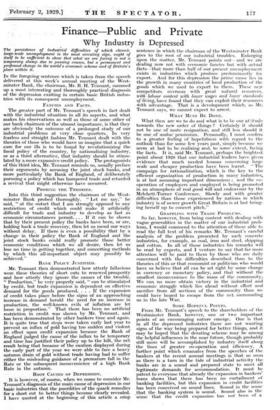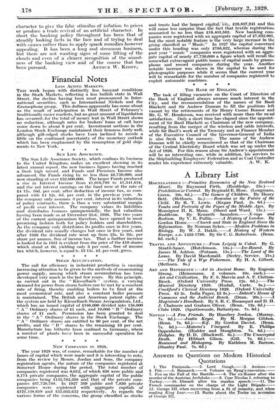Finance—Public and Private
Why Industry is Depressed"
The persistence of industrial difficulties of which chronic large-scale unemployment is the most arresting sign, ought of itself to be sufficient to show that what we are facing is not a temporary slump due to passing causes, but a permanent and profound change in the world's economic scheme and of Britain's place within it.
IN the foregoing sentence which is taken from the speech delivered at this week's annual meeting of the West- minster Bank, the chairman, Mr. R. H. Tennant, summed up a most interesting and thoroughly practical diagnosis of the depression existing in certain basic British indus- tries with its consequent unemployment.
FANCIES AND FACTS.
The greater part of Mr. Tennant's speech in fact dealt with the industrial situation in all its aspects, and what makes his observations as well as those of some other of our bank chairmen of the utmost importance, is that they are obviously the outcome of a prolonged study of our industrial problems at very close quarters. In very fearless and straight fashion Mr. Tennant dealt with the theories of those who would have us imagine that a quick cure for our ills is to be found by revolutionizing the fiscal policy of the country, by nationalizing industry, or as a third alternative, that industry should be stimu- lated by a more expansive credit policy. The protagonists of this third idea, Mr. Tennant reminds us, usually preface their arguments by accusing the joint stock banks, and More particularly the Bank of England, of deliberately pursuing a policy which has hampered trade and retarded a revival that might otherwise have occurred.
PROBING THE THEORIES.
Into this third suggestion the chairman of the West- minster Bank probed thoroughly. " Let me say," he said, " at the outset that I am strongly opposed to any restriction of credit which could make it artificially difficult for trade and industry to develop as fast as economic circumstances permit. .. . If it can be shown that by their present policy the banks have been, or are, holding back a trade recovery, then let us mend our ways without delay. If there is even a possibility that by a change in their policy the Bank of England and the joint stock banks could really promote those better economic conditions which we all desire, then let us lose no time in getting together, and concerting methods by which this all-important object may possibly be achieved."
BANK POLICY JUSTIFIED.
Mr. Tennant then demonstrated how utterly fallacious were these theories of short cuts to renewed prosperity and how utterly they ignore the causes of the trouble. " Production," he very properly said, " can be stimulated by credit, but trade expansion is dependent on effective demand for the goods produced. . . . If the expansion of credit takes place before the signs of an approaching increase in demand herald the need for an increase in production, the well-known evils of inflation are let loose in proportion." That there has been no artificial restriction in credit was shown by Mr. Tennant, and has been demonstrated by other bankers time and again. It -is quite true that steps were taken early last year to prevent an influx of gold having too sudden and violent an effect upon credit expansion because the Bank of England judged the cause of the influx to be temporary and time has justified their policy up to the hilt, the net result being that because of the caution displayed during the early part of the year we were able to face a heavy autumn drain of gold without trade having had to suffer either the misleading guidance of a premature fall in the Rate or the subsequent inconvenience of a high Bank Rate in the autumn.
ROOT CAUSES OF DEPRESSION.
It is 'however, of course, when we come to consider Mr. Tennant's diagnosis of the main cause of depression in our basic industries that the puerilities of the quack remedies for a short cut to better things become clearly revealed. I have quoted at the beginning of this article a crisp sentence in which the chairman of the Westminster Bank gbes to the root of our industrial troubles. Enlarging upon the matter, Mr. Tennant points out—and we are dealing now not with economic fancies but with actual facts—that more than half of our present unemployment exists in industries which produce predominantly for export. And for this depression the prime cause lies in the growth in many countries- of local production of the _ goods which we used to export to them. These new competitors overseas with great natural resources, with labour content with- lower wages and lower standards of living, have found that they can exploit their resources with advantage. That is a development which, as Mr. Tennant says, we -cannot' expect to arrest.
WHAT MUST BE DONE.
What then are we to do and what is to be our attitude towards the new order of things ? Certainly it should not be one of mute resignation, and still less 'should it be one of undue pe§simism. Personally, I must confeis to a greater feeling Of hopefulness with regard to the outlook-than for soiree few years past, simply because we seem at last to be-realizing and, to some extent, facing the facts. It is, said Mr. Tennant, perhaps the brightest point about 1928 that our industrial leaders have given evidence that much needed lessons concerning large scale and cheaper production have been learnt. " The campaign for rationalization, which is the key to the efficient organization of production in many industries, is at last assuming important dimensions ; and the co- operation of employers and employed is being promoted in an atmosphere of real good will and endeavour by the Melchett-Turner Conference. Slowly and with greater difficulties than those experienced by nations in which industry is of newer growth Great Britain is at last bring- ing herself up to concert pitch."
GRAPPLING WITH TRADE PROBLEMS.
So far, however, from being content with dealing with vague generalities in the matter of our industrial prob- lems, I would commend to the attention of those able to read the full text of his remarks Mr. Tennant's careful analysis of the problem presented by such concrete industries, for example, as coal, iron and steel, shipping and cotton. In all of those industries his remarks will be read by experts, and I venture to say that far more attention will be paid to them by those who are daily concerned with the difficulties described than to the theories of this or that economist or politician who would have us believe that all can be set right by some change in currency or monetary policy, and that without the smallest inconvenience to the mass of the community. We can no more obtain victory in the industrial and economic struggle which lies ahead without effort and sacrifice from all sections of the community than we could have hoped to escape from the net surrounding us in the late War.
SOME HOPEFUL POINTS.
From Mr. Tennant's speech to the shareholders of the Westminster Bank, however, one or two important points of an encouraging nature emerge. One is that in all the depressed industries there are not wanting signs of the way being prepared for better things, and it may be hoped that the-derating scheme may be among the helpful influences in the near future, though probably still more will be accomplished by industry itself along the lines of greater co-operation and efficiency. A further point which emanates from the speeches of the bankers at the recent annual meetings is that so soon as there is a turn in the tide of industrial activity the • banks are in a sound and prepared state to meet all legitimate demands for accommodation. It must be patent to everyone that already the expansion in bankers' loans shows that there has been no curtailment of banking facilities, but this expansion in credit facilities has been conceived on sound lines. Sound in the sense that the banking system is sound. Sound also in the `Sense -filar the credit expansion has not been of a character to give the false stimulus df inflation to prices or produce a trade revival of an artificial character. In short the banking policy throughout has been that of :steadily looking filets in the face and of trying to deal with causes rather than to apply quack remedies however appealing. It has been a long and strenuous business, but there are not wanting signs" of some lifting of the clouds and even of a clearer recOgnition of the sound- ness of the banking view and . of the course that has









































 Previous page
Previous page